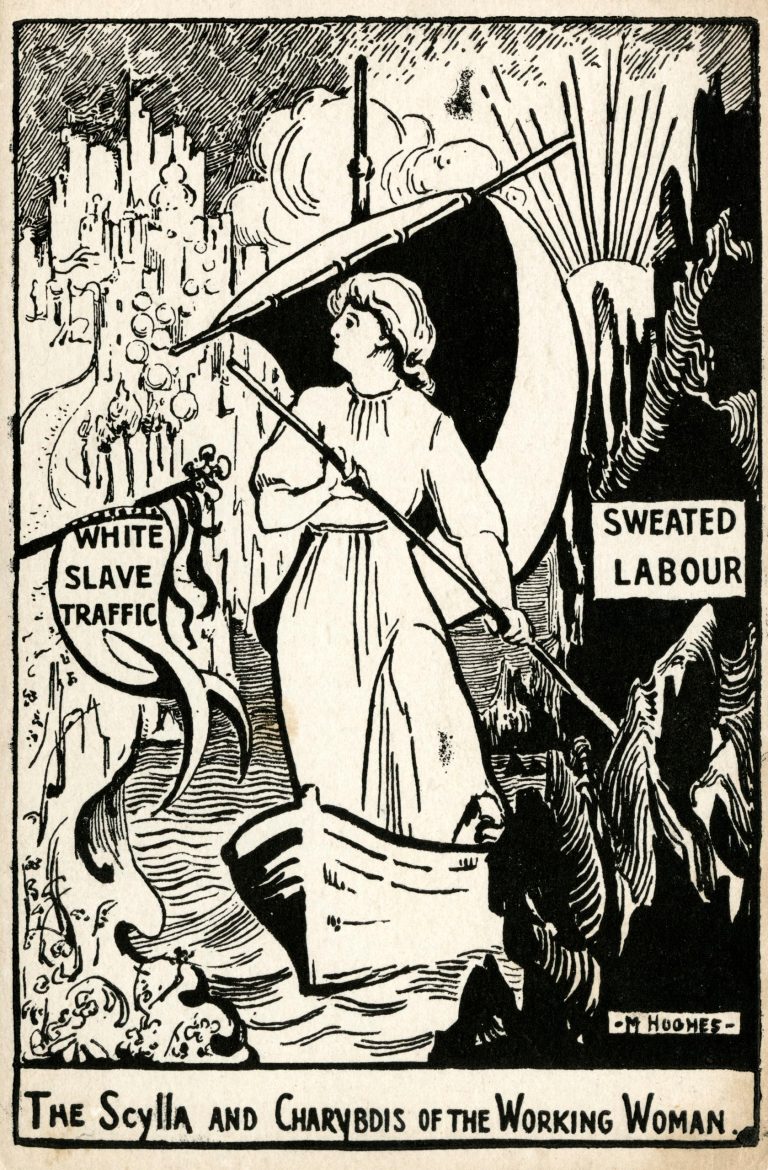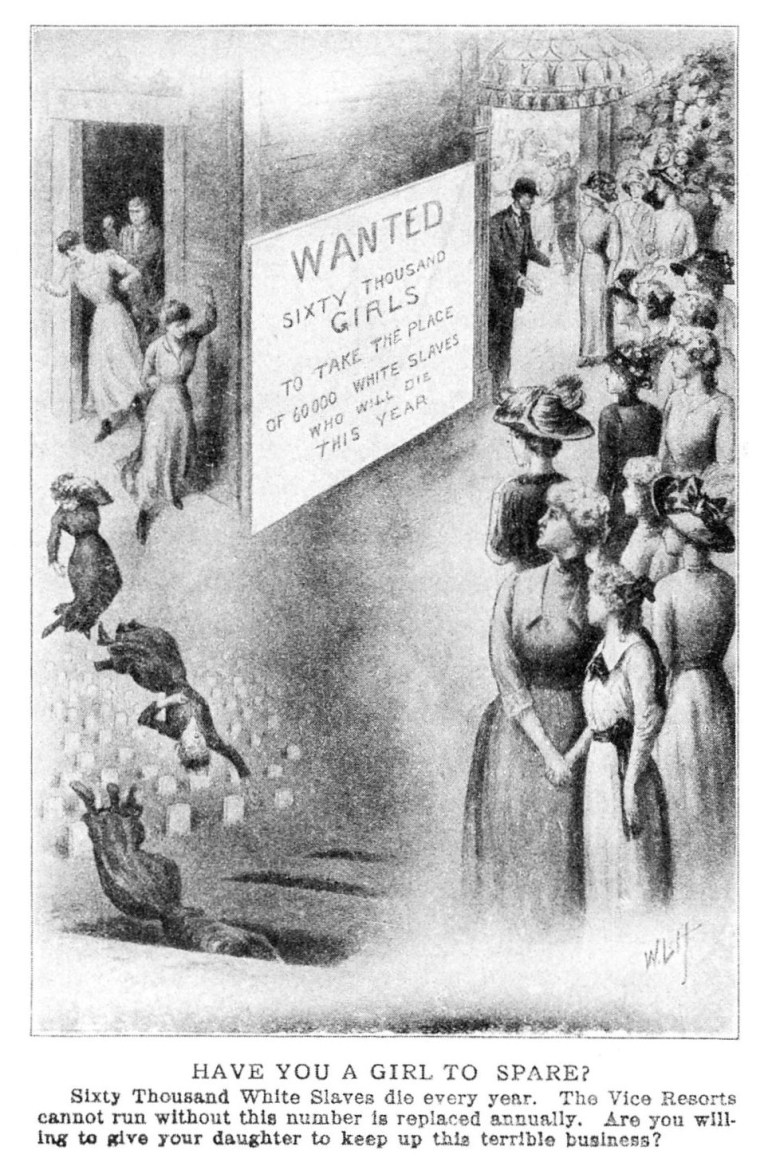To mark International Day to End Violence Against Sex Workers (17 December) Julia Laite reflects on a history of how criminalising the buying or selling of sex puts sex workers at further risk of violence. This piece was originally published at History Workshop Online.
On Wednesday, 9 December, Labour MP Diana Johnson, backed by other prominent Labour back-benchers like Jess Philipps and Sarah Champion, proposed a new bill called ‘The Sex Buyer’s Law’, which aimed ‘to criminalise paying for sex; to decriminalise selling sex; to create offences relating to enabling or profiting from another person’s sexual exploitation; to make associated provision about sexual exploitation online; to make provision for support services for victims of sexual exploitation’. The motion passed and will have its second reading on 29 January.
The bill, like other ‘end demand’ laws passed in Sweden, Ireland, and Canada, has been met with anger and extreme worry by women who sell sex in the United Kingdom. Organizations like DecrimNow, SWARM, and the English Collective of Prostitutes, working with academic experts across a range of disciplines as well as NGOs and frontline health service workers, have produced rigorously evidenced reports on the outcomes of ‘end demand’ legislative models that show how ‘end demand’ legislation does no such thing. Instead, it contributes to the further marginalization of sex workers. ‘End demand’ laws, after all, come with no measures to end poverty or improve the labour alternatives for poor and vulnerable women, so sex workers living under these regimes have to keep selling sex whether they want to or not, in a climate made significantly more hostile by further criminalization.

By contrast, the Labour MPs who support this bill claim it is radical in spirit and feminist in practice, and that it will help prevent trafficking, pimping, and abuse. They present these proposed measures to criminalize the buying of sex as the culmination of a long-standing feminist crusade against abuse within the sex industry, and as a dramatic break from measures that have been used in the past. How might history help explain these incompatible claims?
Prostitution has been a profound and central concern of feminism since its inception, and by the late nineteenth century, feminists rallied around a campaign against the state regulation of prostitution, which forced women to register as prostitutes, subjected them to compulsory medical inspection, and incarcerated them in venereal disease hospitals. Feminists opposed this regulated system of prostitution control because it encouraged pimping and trafficking, and stripped women who sold sex of their human rights. This campaign against the Contagious Diseases Acts, spearheaded by the indominable Josephine Butler, is quite rightly remembered as a victory of early feminism.

What is less well known is that these feminists were equally opposed to state criminalization. They saw measures to crack down on solicitation, or criminalize the selling and buying of sex itself, as the other side of regulation’s coin: it stigmatized and punished women, gave unchecked power to the police, forced women to turn to third parties for support, all the while offering no meaningful way out of prostitution.
In the 1920s, the leading feminist organization concerned with prostitution, the Association for Moral and Social Hygiene (today, The Josephine Butler Society), succeeded in doing something rather incredible: it got every major feminist organization, including many more conservative women’s organizations like the St. Joan’s Catholic Women’s Alliance and the National Council of Women, to declare their collective support for a bill demanding the total decriminalization of street solicitation on the grounds that, in the words of the AMSH’s secretary Alison Neilans, ‘prostitution is grievous vice, but it cannot be made a crime without grave injustice’.
Ostensibly, the sex buyer’s law aims to ‘decriminalize the selling of sex’ (they have yet to clarify precisely what they mean by this because selling sex is actually already legal in the United Kingdom). History, however, shows us the myriad means the police have (and will continue to have) at their disposal to ‘clear the streets’ and criminalize women: solicitation laws, vagrancy laws, public order laws, anti-social behaviour orders. The bill seems to address none of these. The Sex Buyer’s bill does nothing to decriminalize the spaces in which women work, and nothing to regularize their migration routes into the UK. Therefore, it will do nothing to prevent the criminalization and deportation of vulnerable women.
When confronted with the suggestion that criminalizing clients could be a solution to the moral and social problem of prostitution, early twentieth century feminists replied that they did not want an ‘equality of injustice’, nor an increase to already worrying police powers. In the last years of her life, Josephine Butler frequently reflected on the worrying trend of morality campaigners turning to what she called ‘repressive measures.’ Butler, and the feminists who carried her legacy forward into the twentieth century, wanted laws and policies that protected all women equally. They referred to laws specifically targeting prostitution as ‘laws of exception’, and demanded they be replaced by strong, universal, and prosecutable laws that protected all people from sexual exploitation, abuse, and harassment, regardless if the crime was related to prostitution or not.
There were indeed strong voices advocating for the criminalization of sex buyers in the late nineteenth and early twentieth century, but they were largely not feminists. Instead, this perspective was advocated for by a conservative, male-led, moral reform movement, that believed it was indeed possible to ‘make men moral by an Act of Parliament’. These moral reform campaigners wished to see prostitution totally criminalized, and all migration for those identified as prostitutes (and pimps) banned.

These moral reformers spoke a language remarkably similar to the one being spoken by today’s Labour MPs and those that support them. Early twentieth century moral reformers traded in stories of extreme exploitation. They sentimentalized over poor and helpless women and spoke at length about how many they had ‘saved’ through their ‘good works’. They positioned themselves as the only interlocuters for women ‘who are literally nameless and unknown’, while suppressing, ignoring, or erasing the words of women in the sex industry. They advocated—seemingly on faith alone—that more policing and more criminal law would be a solution to a social problem caused by endemic, gendered poverty and labour exploitation. Seeing this same rhetoric echoed in the present day—especially at a time when forward-thinking policy makers are looking for ways to reduce criminalization and policing—is a particularly disappointing kind of déjà vu.
The early feminist proposals to decriminalize prostitution were defeated again and again in Parliament. The moral reformers, on the other hand, mostly got their wish. Laws against brothels forced women to work alone, or to find pimps who would pose as (or indeed become) husbands to secure accommodation. The first Aliens Acts in the UK, passed in 1905 and 1920, made prostitution-related offences specific and particular grounds for deportation. Hundreds of women were kicked out of the United Kingdom in the years that followed, and the Home Office’s own archive is filled with cases of women forced to contract with exploitative pimps and traffickers in order to circumvent this new immigration law. We therefore have a hundred years of evidence that tells us that it is immigration restrictions, the total criminalization of women working together, and a lack of decently-paid, safe, and viable licit work for women that creates an environment ripe for exploitation by pimps, traffickers, and clients.
Whatever moral reformers (past or present) might claim, criminalizing the purchase of sex is no different from criminalizing the selling of sex. Firstly, neither method does anything to change the structural and material inequalities that make women choose to sell it, or that enable third parties to force them to sell it. Secondly, while the laws may claim to be very different as written in the statute book, in practice—as enforced—they are virtually the same: they push prostitution further underground.
There is not, nor has there ever been, any evidence that criminalizing demand prevents trafficking. There are already laws against the kidnap, forcible confinement, rape, and sexual violence that are endemic to the sex trade, laws that early feminists fought for–but these cases go largely unprosecuted. Why would a vulnerable, exploited woman report a criminal client or pimp, when the prize for doing so is often dismissal as a unconvincing victim by police and prosecutors? Why would a migrant woman, trapped in a brothel by traffickers, go to the police when the end game for her is deportation (and very often re-trafficking, because her material circumstances will not have changed)? Why would she seek help exiting prostitution, when the alternative is a job that pays below the living wage, or Universal Basic Income that doesn’t cover the cost of her own or her children’s food? ‘What will you give me if I do give this up,’ asked one woman interviewed by a sociologist in the 1950s. ‘A job at a laundry for two pounds a week?’ It is a question asked again and again by sex workers today, and one that this bill utterly fails to answer.
Why are Labour MPs—of all people—ignoring this evidence, which stretches from over a hundred years ago right up to the present day? Why are they claiming their proposal to be a legacy of radical feminist campaigns, when it is so clearly descended from conservative campaigns for moral reform? And how can they, as MPs for a party founded on the dream of social equality and labour rights, be so blind to the economic causes of prostitution? ‘The wages of prostitution are stitched into your button-holes,’ George Bernard Shaw wrote in 1912, in opposition to a new law further criminalizing prostitution. This is as true today as it was then.
As complicated as the history of prostitution can be, it imparts a relatively simple lesson: criminalizing something does not make it go away. This is particularly true when the ‘crime’ in question is part of the ‘shadow economy’, and when people are forced to work within this economy by inadequate alternatives that would enable them to economically survive outside of it. Women will not stop selling sex because there is a drop in demand: they will just have to work more and charge less. Men will not stop buying sex because it is illegal to do so. But they will buy sex in more furtive, evasive, and harmful ways.
Here, it was police officers, even more than feminists, who saw the writing on the wall. When brothels, defined as a place where more than one woman sold sex, were first criminalized in 1885, it was police who worried over the way that this would force women out on the street, or into isolated rooms. When moral reformers pressured the state to crack down on street solicitation in order to make public space welcoming to ‘ordinary, decent citizens’, it was police who resisted, preferring to allow informal tolerance zones where sex could be bought and sold under some degree of supervision. And when John Wolfenden and his Committee proposed what would become the Street Offences Act in 1959, it was police officers who gave evidence that they believed it would push prostitution underground and increase women’s reliance on third parties. In 1960, after commissioning research on the impact of this new law, the Josephine Butler Society declared it to be a ‘pimp’s charter’.
Finally, when kerb krawling laws were passed in the 1980s, it was the police, and the newly founded English Collective of Prostitutes, who raised concerns: this attempt to criminalize the buying of sex resulted in high-speed transactions. Women jumped into cars without screening clients or telling other sex workers. They ran a very high risk of taken to isolated areas, raped, robbed, and abandoned. Reports from countries that have implemented more recent sex-buying laws tell us this history is repeating itself.
All of these laws were passed in the name of public morality and the protection of women. All of them had the opposite effect. How many times—even with the best interests of vulnerable women in our hearts–will we make the same mistake?
I share the concerns of the Labour MPs who have put forward this bill. While I do acknowledge that some women enjoy selling sex and find it empowering, it is not those women who are foremost in my mind. Trafficking and sexual exploitation within prostitution are very real and are actively harming women as I write. There are few sex workers—and few historians and feminists—who would argue that any man has a God-given, or state-given, right to buy sex. I have spent countless difficult hours trolling through hundreds of archive files that detail horrific instances of client and third-party violence, and police violence, against sex workers. I want to live in a future where this violence is eradicated.
The heart of the disagreement—historical and contemporary–has never been over whether sexual labour is empowering or exploitative; it has been over the best ways to prevent exploitation. The historical record could not be clearer: criminalization—no matter who is targeted—does not work. Robust social welfare support, decent labour alternatives, and access to regularized routes to asylum and migration might. Perhaps when these problems are solved, we might then reasonably focus on ‘making men moral by an Act of Parliament’. Until then, I urge those who support this bill to look back to the actual feminist past—not the legacy of punitive, carceral, moral reform—for their historical lessons.
 Julia Laite is a Reader in Modern History at the Department of History, Classics and Archaeology at Birkbeck, University of London and the Principal Investigator on the AHRC-funded project Trafficking Past. She is the author of Common Prostitutes and Ordinary Citizens: Commercial Sex in London, 1885-1960 and the forthcoming book The Disappearance of Lydia Harvey: One Trial, Six Lives and the Dawn of the Twentieth century, which reconstructs the polyvocal and complex history of a case of sex trafficking in the early twentieth century world. (Image: Annie Dressner Photography)
Julia Laite is a Reader in Modern History at the Department of History, Classics and Archaeology at Birkbeck, University of London and the Principal Investigator on the AHRC-funded project Trafficking Past. She is the author of Common Prostitutes and Ordinary Citizens: Commercial Sex in London, 1885-1960 and the forthcoming book The Disappearance of Lydia Harvey: One Trial, Six Lives and the Dawn of the Twentieth century, which reconstructs the polyvocal and complex history of a case of sex trafficking in the early twentieth century world. (Image: Annie Dressner Photography)

NOTCHES: (re)marks on the history of sexuality is licensed under a Creative Commons Attribution-NonCommercial-NoDerivatives 4.0 International License.
Based on a work at www.notchesblog.com.
For permission to publish any NOTCHES post in whole or in part please contact the editors at NotchesBlog@gmail.com





thank you for writing this! I had been meaning to read up more about the broader politics of Josephine Butler and other feminists /feminist organising fron that era in the UK- and now i have a way better foundation to work from!
I just wanted to add some thing which may be was not super clear in the text and which I have see. lots of sex workers and accomplices to our struggles for justice falling for recently- which is around the idea of less people paying for sex after sex purchase ban was introduced in sweden. it is an argument that is made by antis all the time… although these days even the most staunch swedish model lobbyists have been switching to a line of rhetoric which admits that Swedens sex industry is growing- just not at the rate that neighbouring countries have seen. The contentious nature of such claims can be found in the fact that there is no real baseline data unless you rely on the incredibly dodgy figures cited in the governments own review- which are limited to observations by social workers of how many street based sex workers that estimate to be working on a particular night before 1999 vs the number of people sighted in tbe st area who are assumed to be st based workers on an evening after the ban came in- during the middle of a prolonged police blitz on the area- and during a time in which many were moving to online work. In a city where the thermometer fails to even reach double figures during the day time for half the year.
the same government report by Anna skahed also notes that online ads have gone up approx 700% over the same period. but of course this is dismissed as unreliable evidence… maybe sex workers have just been getting multiple accounts or something. in anycase its not counted and so the overall official narrative became one of “sex work has reduced” based on dodgy data that represents less than 5% of the industry and in defiance of contradicting evidence which should have been seen as more reliable if it weren’t for the fact that the report is written in such a biased way.
other than that there’s only one other thing that’s cited as evidence that I’ve seen. and that is the data from the two surveys asking have you ever paid for sex? which shows a substantial drop between the two studies-one which was sone before 1999 the other after 1999. however, due to the nature of the question asking if people have ever paid for sexual services during their lifetime, and the to the number of years that had passed between the two surveys- criminologists did the maths and denounced the usage of these figures in arguments where they are claimed as proof that less people are paying for sex these days. Why? Because the drop is so severe that it actually proves that this data is showing something else…probably its reflecting the respondents discomfort with the risks of disclosing a criminal act with little guarantee of their safety and little to gain. And/or it may also reflect that the sample sizes weren’t big enough and that there’s bias in some part of the process. All we can be sure of is that it doesn’t show a drop in people paying for sex. As if that were the case it would be a much smaller drop in %. Given that once someone pays for sex, you can’t un-buy it. Thus the only drop in % would have to be via people dying and new people coming of age (or migrating to sweden) and never paying for sex at rates substantially different to current rates. which would take quite a while given that the starting point is less than 15% admitting to paying for sex to begin with.
and while I understand it was a phenomenon that occured on the st for a while- that “good” clients were scared off & work became scarce…and while I understand its an established phenomenon that policing our clients leads to reduced negotiation times and rushed negotiations between jittery people – which means police evasion ends up prioritised over focus on reading clients- I think it’s important to come back to the point around why this is the case…that is…that st based sex workers generally fear police much more than our clients. and indeed there a many surveys including another horizon in a swedish context (only in swedish at the moment) which show that clients are the group of people that perpetrate the least violence towards st based sex workers or sex workers in general. and that its much more by authorities, service providers, family members, members of public… I know u raise this stuff but i just feel it cannot be emphasized enough ..and I worry that in many other peices there are kinda vague claims about increased violence..which I fear the public will interpret as violence by clients . and some of it is of course but the degree to which clients perpetrate violence is often enormously overestimated due to the mainstream media and due to those who have bested interests in such narratives (such as groups looking to be funded to save us)